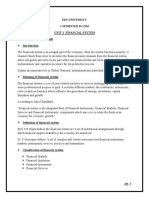0% found this document useful (0 votes)
33 views2 pagesFinancial Market Notes
The document outlines the functions and types of financial markets, highlighting their role in mobilizing savings, facilitating price discovery, providing liquidity, and reducing transaction costs. It distinguishes between capital markets, which deal with long-term securities, and money markets, which handle short-term instruments. Additionally, it discusses the importance of stock exchanges and the regulatory role of SEBI in ensuring fair trading practices and protecting investors.
Uploaded by
sri.kashish1706Copyright
© © All Rights Reserved
We take content rights seriously. If you suspect this is your content, claim it here.
Available Formats
Download as DOCX, PDF, TXT or read online on Scribd
0% found this document useful (0 votes)
33 views2 pagesFinancial Market Notes
The document outlines the functions and types of financial markets, highlighting their role in mobilizing savings, facilitating price discovery, providing liquidity, and reducing transaction costs. It distinguishes between capital markets, which deal with long-term securities, and money markets, which handle short-term instruments. Additionally, it discusses the importance of stock exchanges and the regulatory role of SEBI in ensuring fair trading practices and protecting investors.
Uploaded by
sri.kashish1706Copyright
© © All Rights Reserved
We take content rights seriously. If you suspect this is your content, claim it here.
Available Formats
Download as DOCX, PDF, TXT or read online on Scribd
/ 2















































































